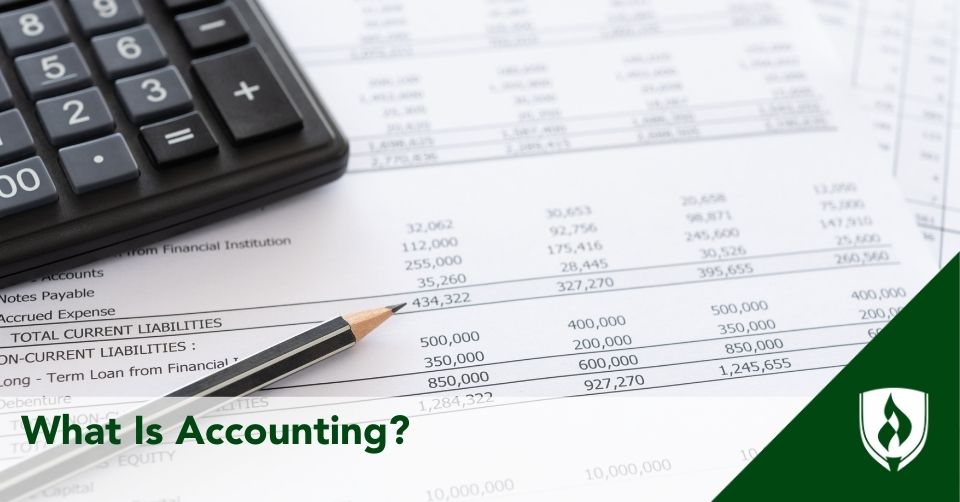What Is Accounting?
01/14/2026

Understanding accounting begins with recognizing1 it as a structured system for recording, organizing, and reporting financial transactions. Accounting typically creates the framework organizations use to track their financial information, maintain reliable financial records, and communicate their financial position. Through this foundation, organizations may manage financial systems, interpret financial data, and understand changes in their company’s financial health over time.
Accounting may support1 both internal and external needs, from general financial reporting to regulatory compliance. It may help to ensure that organizations present accurate financial statements, follow established accounting standards, and maintain transparency about their business operations. For publicly traded companies, this transparency is especially important for meeting the expectations of oversight bodies such as the U.S. Securities and Exchange Commission®.
How Accounting Supports Organizational Decision-Making
Accounting typically helps1 organizations to track core financial documents, including the balance sheet, income statement, and cash flow statement, that together may show the organization’s financial health. These financial statements can help leaders understand activity such as sales revenue, expenses, and cash flow patterns and help support decisions based on consistent and comparable financial data.
Accurate accounting practices may also support1 compliance with requirements in frameworks such as the Internal Revenue Code, as well as processes related to reporting, audits, and tax-related documentation including tax returns and tax liabilities. Whether an organization follows Generally Accepted Accounting Principles (GAAP) or International Financial Reporting Standards® (IFRS®), these structured guidelines may help shape how reporting financial transactions is completed each accounting period.
How Accounting Typically Works
Accounting relies on a methodical structure known as the accounting process1, which begins with recording business transactions and continues through the creation of complete financial documents. Many organizations may choose to rely on modern accounting software or integrated accounting systems to streamline routine accounting tasks such as data entry, reconciliation, and ongoing maintenance of accounting records.
This steady recordkeeping and analysis may help organizations monitor:1
Financial performance
Cash flow
Changes in the organization’s financial information
The accuracy of financial documents
The financial systems that support daily operations
The Accounting Cycle
The accounting cycle2 outlines the steps involved in gathering and processing financial information during each accounting period.
The process typically includes:2
Identifying and categorizing business transactions
Recording journal entries
Posting entries to the general ledger
Preparing an unadjusted trial balance
Making adjusting entries
Producing an adjusted trial balance
Preparing financial statements
Closing the books
This repeated cycle may support accurate accounting and may help make sure that financial information remains current and reliable. With modern technology, some accounting software may be able to automate these1 steps.
Types of Accounting and Their Organizational Roles
Accounting includes several branches, each focused on different organizational needs:1
Financial Accounting
Concentrates on the preparation of standardized financial statements based on accepted accounting principles GAAP. It provides a clear view of a company’s finances for external reporting.
Managerial Accounting
Involves developing internal analyses that help organizations interpret financial records for planning, budgeting, and evaluating financial position.
Cost Accounting
Examines the costs associated with operations and production. This may help organizations understand how resources flow through the business.
Tax Accounting
Focuses on rules established by the Internal Revenue Service and the Internal Revenue Code. It involves maintaining compliance with tax regulations and organizing information used to prepare tax returns.
Project Accounting
Tracks financial activity for individual projects, integrating costs, revenues, and overhead. Project accountants may prepare reports that help project managers monitor progress and make adjustments to budgets and project plans as needed.
Accounting Standards, Principles, and Rules
Accounting practices rely on structured guidelines that establish consistency and accuracy:1
U.S. public companies typically use Generally Accepted Accounting Principles (GAAP) to form the foundation of financial accounting.
International Financial Reporting Standards (IFRS) may help promote global consistency for worldwide public companies.
Regulatory agencies, including the Securities and Exchange Commission, may help ensure that publicly traded companies follow these standards.
These accounting principles, accounting standards, and accounting rules typically guide the creation of comparable financial statements that reflect an organization’s financial position.
A Look at Accounting History
Accounting has a long history,3 beginning with double-entry bookkeeping codified in the 15th century by Luca Bartolomes Pacioli, building on earlier work by Benedetto Cotrugli. Improved financial reporting has historically supported economic growth by attracting investment, as seen during the Industrial Revolution with railroads and in the 1920s with the U.S. automobile industry.
The Great Depression highlighted the need for accounting reform,3 leading to the creation of the U.S. Securities and Exchange Commission (SEC) and the development of formal accounting standards overseen by professional bodies like the American Institute of Certified Public Accountants®.
Modern Accounting Systems
Today, organizations typically1 use cloud-based systems or integrated accounting systems to support routine accounting tasks, maintain financial documents, and organize financial systems. These platforms may help ensure consistency in tracking cash flow, managing business transactions, and preparing financial statements.
These tools may also help monitor1 financial performance by consolidating data from across the organization into one place, creating a clearer picture of a company’s financial health and the activity that shapes its financial position.
Exploring Your Next Steps in Accounting
For anyone in the early stages of exploring what accounting is, the key idea is that accounting may help provide a clear, organized way to understand financial information and the activity behind it.
By tracking financial transactions, maintaining consistent accounting records, and using established accounting principles and standards, organizations may be able to create accurate financial statements that reflect their financial position at any point in time.
Whether through financial accounting, managerial accounting, cost accounting, or other types of accounting, the overall purpose remains the same: To offer a reliable view of a company’s finances so that information is clear, structured, and useful for understanding how an organization is functioning.
Ready to take the next step? Discover the career paths and opportunities that an accounting degree can offer in What Can You Do With an Accounting Degree.
The U.S. Securities and Exchange Commission® is a registered trademark of the U.S. Securities and Exchange Commission (AGENCY OF THE UNITED STATES GOVERNMENT; District of Columbia, USA).
The International Financial Reporting Standards® and IFRS® are trademarks of the INTERNATIONAL FINANCIAL REPORTING STANDARDS FOUNDATION (CORPORATION; DELAWARE, USA).
American Institute of Certified Public Accountants® is a registered trademark of the AMERICAN INSTITUTE OF CERTIFIED PUBLIC ACCOUNTANTS (CORPORATION; DISTRICT OF COLUMBIA, USA).
NetSuite® is a registered trademark of NetSuite Inc. (CORPORATION; DELAWARE, USA).
The Financial Accounting Foundation® is a registered trademark of the
Financial Accounting Foundation (non-profit organization; DELAWARE, USA).
1NetSuite®, Accounting Overview, athttps://www.netsuite.com/portal/resource/articles/accounting/accounting.shtml (accessed Dec. 2, 2025).
2NetSuite®, What Is the Accounting Cycle? The 8 Steps in the Accounting Cycle, at https://www.netsuite.com/portal/resource/articles/accounting/accounting-cycle.shtml (accessed Dec. 2, 2025).
3Financial Accounting Foundation®, History of Accounting and Accounting Standards, athttps://accountingfoundation.org/page/PageContent?pageId=/accounting-and-standards/accounting-standards/history-of-accounting.html (accessed Dec. 2, 2025).



